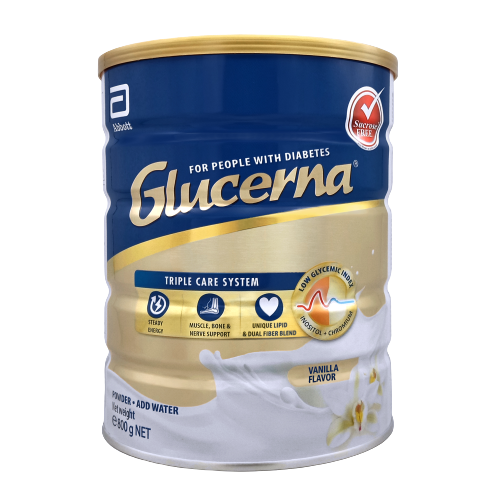Glucerna triple care
- Main Image
-

- Subtitle
- Complete and Balanced Nutrition For People with Diabetes
- Title
- Glucerna® Triple Care
- Detail Page Path
From this article, find out more on how diabetes affects the health of your bones and get tips on how you can better support bone health!
It can be hard to keep a healthy diet when experiencing Diabetes Burnout. Diabetes Burnout is a natural and rational response to living with this demanding, long-term condition. It affects 44% of people diagnosed with diabetes and has been consistently linked with higher HbA1c levels.
Many clinical studies have established that poor glycemic control and chronic hyperglycemia have direct and detrimental effects on bone quality in patients with Type 2 diabetes mellitus, resulting in increased risk for fractures.1 This risk increases with age, duration of diabetes and insulin therapy.2
The use of diabetes medication like thiazolidinediones and diabetes-associated complications, such as vitamin D deficiency3, neuropathy, muscle weakness, episodes of low blood sugar, and vision problems can also contribute to increased risk of falls and fractures.2
A diet rich in calcium and vitamin D is important to build strong and healthy bones. Eating a variety of foods while adding on nutritional supplements can help you attain your daily calcium and Vitamin D requirements.4
Calcium: Calcium plays many critical roles in your body and an adequate intake of calcium is required to build strong bones. The Recommended Daily Allowance set by the Health Promotion Board is between 800mg -1000mg for adults.5
Good sources of calcium include dairy foods (milk, yoghurt, cheese), fish with edible bones (sardines, ikan bilis), tofu made with calcium salts, lentils, green leafy vegetables and calcium fortified food such as bread, biscuits and soybean milk.
Vitamin D: Vitamin D is also essential to support strong bones as it is needed for calcium absorption. The Recommended Daily Allowance set by the US Institute of Medicine, Food and Nutrition Board is between 15mcg-20 mcg for adults.6 Food sources of vitamin D include eggs, liver, oily fish (salmon, sardine, mackerel) and fortified food products such as selected brands of milk, soymilk, yogurt, orange juice, ready-to-eat cereals and margarine.7 Adequate exposure to the sun helps in the production of vitamin D too.4
Regular exercise is important for people with diabetes as it helps improve insulin sensitivity, which in turn may help lower blood glucose levels. Additionally, it can also benefit you by helping to prevent bone loss, enhancing balance and flexibility and reducing the likelihood of falling. Ideal exercises to build bone strength are weight-bearing and resistance exercises. Weight-bearing exercises include walking, stair climbing, and dancing, while resistance exercises include lifting weights.8
Eliminating bad habits like smoking and consuming alcohol from your lifestyle can benefit your bones. Studies have found that people who smoke may absorb less calcium from their diets while heavy drinkers are more prone to bone loss and fractures because of poor nutrition as well as an increased risk of falling.
Consult your healthcare professionals on how calcium and Vitamin D supplements may benefit you as part of your diabetes management plan!
References:
1 Diabetes and Fractures — An overshadowed association. Curr Opin Endocrinol Diabetes Obes. 2009 Dec; 16(6): 435–445. doi: 10.1097/MED.0b013e328331c7eb
2 Moayeri, Ardeshir et al. “Fracture risk in patients with Type 2 diabetes mellitus and possible risk factors: a systematic review and meta-analysis.” Therapeutics and clinical risk management vol. 13 455-468. 11 Apr. 2017, doi:10.2147/TCRM.S131945
3 Moseley KF. Type 2 diabetes and bone fractures. Curr Opin Endocrinol Diabetes Obes. 2012;19(2):
4 HPB Health Hub- Daily Calcium Intake – For Greater Bone Strength Website: https://www.healthhub.sg/live-healthy/518/Calcium%20-%20For%20Greater%20Bone%20Strength
5 HPB Health Hub- Recommended Dietary Allowances. Website:https://www.healthhub.sg/live-healthy/192/recommended_dietary_allowances
6 NIH Vitamin D- Fact Sheet for Health Professionals. Website:https://ods.od.nih.gov/factsheets/VitaminD-HealthProfessional/
7 Vitamin D: Recommended Dietary Allowances, Food Sources, and Side Effects https://www.healthxchange.sg/food-nutrition/supplements/vitamin-d-recommended-dietary-allowances-food-sources-side-effects
8 NIH Osteoporosis and Related Bone Diseases National Resource Center – What People With Diabetes Need To Know About Osteoporosis Website: https://www.bones.nih.gov/health-info/bone/osteoporosis/conditions-behaviors/diabetes
SG.2022.29988.GLU.1(V1 .1)

Understand the best way to tackle diabetes prevention, by embracing an active lifestyle and setting 'SMART goals'.

Learn the healthiest and safest way to exercise with diabetes. Here are 9 top tips to help you get started.
You are about to exit for another Abbott country or region specific website.
Please be aware that the website you have requested is intended for the residents of a particular country or region, as noted on that site. As a result, the site may contain information on pharmaceuticals, medical devices and other products or uses of those products that are not approved in other countries or regions.
The website you have requested also may not be optimized for your specific screen size.
Do you wish to continue and exit this website?